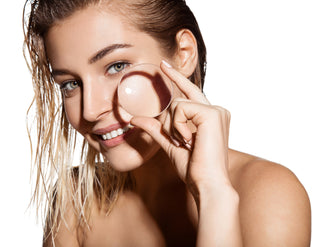“Sensitive” is a common word used to describe a skin type. Research indicates that about 50% of women and 30% of men identify as having sensitive skin. But what does it really mean to have “sensitive” skin?
Very Sensitive
Truly sensitive skin's may experience painful or uncomfortable sensations accompanied by physical responses to a trigger. Common symptoms include localized areas of redness or flushing, burning or itching, and dry scaly patches. Generally, individuals who experience asthma or seasonal allergies, or have a history of eczema, may be more sensitive to inflammation in the form of dermatitis on the face, scalp, and/or body.
Redness
Facial flushing in response to spicy foods and heat does not necessarily indicate rosacea or sensitivity. There are three pigments in our skin give it color: melanin, hemoglobin, and carotenes. If your skin has a tendency to flush (face and body), it’s likely due to higher levels of hemoglobin and/or an increase in the number (or diameter) of skin capillaries, or it may be a sign of rosacea.
Delicate Skin
Delicate skin types may experience sensitivity from heightened sensory receptors. These receptors are also expressed in keratinocytes and can be responsive to skin care products and the environment. Tingling, burning, stinging or itching are common symptoms, but there are no visual clues that indicate an inflammatory response is happening—because there aren't any.
Tips From Skin Care Professionals
1.
Sensitive skin types have a hard time finding good skin care products, and have concerns with poor barrier functions and dehydration. Ultrasonic facials every 4 weeks are the best to reduce dehydration and improve skin texture and suppleness, without triggering sensitivity.
Alexis, Aesthetician
2.
Most sensitive and rosacea skin types have poor cell turnover and rough skin texture. Light glycolic acid peels and pumpkin enzymes are amazing at giving an overall improvement for these skin types.
Desiree, Laser Tech + Aesthetician
3.
Redness and capillary damage are stubborn skin concerns and common with rosacea, fair skins, or sun damage. Advanced Repair Serum at home helps prevent inflammatory triggers and vascular redness. IPL Photofacials are the best at rapidly reducing redness and broken capillaries.
Morgan, Laser Tech + Permanent Makeup Artist
Avoid common triggers of redness and inflammation, including:
- Extreme heat and cold
- Sun exposure
- Vasodilators
- Hot drinks
- Spicy foods
- Smoking
- Alcohol
- Some cosmetics
- High intensity or strenuous workouts





